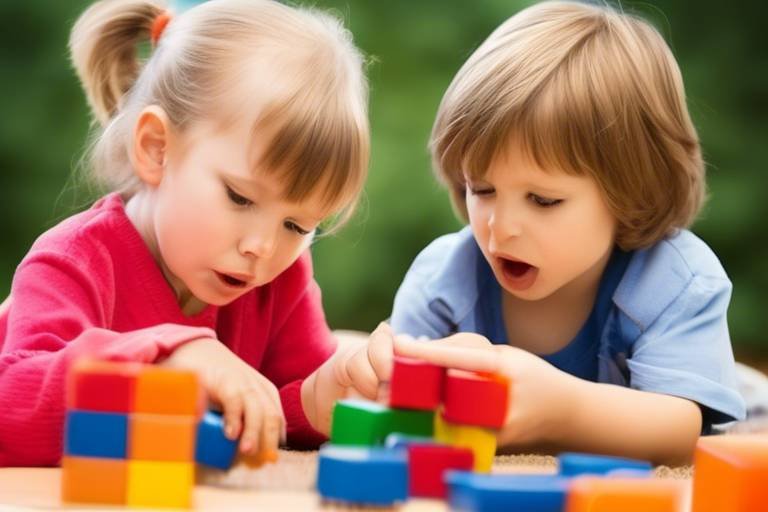The Importance of Praise in Building Confidence
Praise is more than just a few kind words; it’s a powerful tool that can shape our self-esteem and confidence. Think of it as the sunshine that helps the seeds of potential grow into beautiful flowers. When we receive praise, especially during our formative years, it can significantly influence how we view ourselves and our abilities. It’s like a mirror reflecting our worth back to us, but the reflection can vary dramatically depending on the type of praise we receive. The right kind of praise can motivate us to reach new heights, while the wrong kind can lead to self-doubt and a fixed mindset.
As we dive deeper into this topic, we’ll explore the psychology behind praise and why it is crucial for building confidence, particularly in children. By understanding the nuances of praise, we can harness its power to foster resilience and a positive self-image. Imagine a child who hears, “You did a great job!” versus “You really worked hard on that!” The difference is subtle yet profound, shaping their perception of success and failure. This article will guide you through the different types of praise and their effects, helping you become more intentional in your approach to encouraging others.
In a world where self-doubt can creep in at any moment, knowing how to effectively use praise can be a game changer. Whether you’re a parent, teacher, or friend, the way you acknowledge achievements can either build a sturdy foundation of confidence or leave cracks in self-esteem. So, let’s embark on this journey to understand the importance of praise in building confidence, and discover how we can use it to empower ourselves and those around us.

The Psychology Behind Praise
Praise is more than just a few kind words tossed around; it’s a powerful psychological tool that can reshape how we view ourselves and our abilities. When we offer praise, we're not merely complimenting someone's actions; we're sending a message that can significantly influence their self-perception and drive. Think of praise as a seed planted in the garden of self-esteem. With the right care and nurturing, that seed can grow into a robust tree of confidence and resilience.
At its core, praise functions as a form of positive reinforcement. When individuals receive acknowledgment for their efforts or achievements, it activates the brain's reward system, releasing feel-good chemicals like dopamine. This chemical reaction not only makes us feel good in the moment but also encourages us to repeat the behaviors that led to the praise. So, the next time you hear someone say, "Great job!" or "You worked really hard on that!", remember that those words are more than just pleasantries; they're a catalyst for motivation and self-improvement.
However, the impact of praise isn't uniform. It varies based on how it’s delivered and the context in which it’s given. For instance, when we praise a child's effort in completing a difficult puzzle, we’re not just celebrating the end result; we’re instilling a sense of perseverance and resilience. This type of praise can lead to a growth mindset, where the individual learns to embrace challenges and view failures as opportunities for learning. Conversely, if someone is constantly praised for their innate talent, they may develop a fixed mindset, believing that their abilities are static and unchangeable. This can create a fear of failure, making them more hesitant to take risks.
To illustrate this point, consider the following table that summarizes the psychological effects of different types of praise:
| Type of Praise | Psychological Effect | Long-Term Impact |
|---|---|---|
| Effort-Based Praise | Encourages resilience and a growth mindset | Fosters a love for learning and adaptability |
| Ability-Based Praise | Boosts self-esteem but may lead to a fixed mindset | Can create fear of failure and avoidance of challenges |
| Person-Focused Praise | Can enhance or undermine self-worth | Long-term effects depend on context and delivery |
In summary, the psychology behind praise is complex and multifaceted. Understanding its effects can empower us to use it wisely, especially when it comes to nurturing the confidence of children and individuals in our lives. By choosing our words carefully and focusing on effort and growth, we can help cultivate a mindset that thrives on challenges and sees failures as stepping stones to success.

Praise is not just a simple "good job" or "well done." It comes in various forms, each carrying its own weight and implications. Understanding the different types of praise is crucial for anyone looking to nurture confidence in themselves or others, especially children. The three main types of praise are effort-based praise, ability-based praise, and person-focused praise. Each type plays a unique role in shaping self-esteem and motivation, and knowing how to use them effectively can make a world of difference.
Let's dive deeper into these categories. First up, we have effort-based praise, which centers around the hard work and dedication someone puts into a task. This type of praise emphasizes the process rather than the outcome, making it a powerful tool for fostering resilience. When children hear, "I really admire how hard you worked on that project," they learn to value their effort and persistence, which can lead to a growth mindset. This means they are more likely to embrace challenges and see failures as opportunities for learning.
Next, we have ability-based praise, which focuses on innate talents or skills. While this might sound flattering—like telling someone, "You're so smart!"—it can inadvertently create a fixed mindset. This is because individuals may start to believe that their intelligence or skills are static traits that can't be changed. If they encounter a setback, they might feel discouraged, thinking that they simply aren't "good enough." This type of praise can boost self-esteem in the short term, but it may not contribute to long-term confidence and motivation.
Lastly, we have person-focused praise, which centers on the individual rather than their actions. Statements like "You are such a kind person" can either uplift or hinder self-esteem, depending on how they are delivered. If the praise is genuine and specific, it can bolster a person's self-worth. However, if it feels insincere or is used excessively, it can lead to pressure and anxiety, making individuals feel they must constantly live up to that label.
To summarize, the type of praise given can significantly impact an individual's self-esteem and motivation. Here’s a quick comparison of the three types:
| Type of Praise | Focus | Potential Impact |
|---|---|---|
| Effort-Based Praise | Process and hard work | Encourages resilience and a growth mindset |
| Ability-Based Praise | Innate talents and skills | Can lead to a fixed mindset and fear of failure |
| Person-Focused Praise | The individual | Can enhance or undermine self-worth based on delivery |
Recognizing the nuances between these types of praise is essential for anyone who wants to foster confidence effectively. By tailoring praise to the individual and the situation, we can help build a strong foundation of self-esteem that encourages growth, resilience, and a love for learning.
Effort-based praise is a powerful tool in nurturing resilience and a growth mindset in individuals, especially children. When we focus on the hard work and dedication someone puts into a task, rather than just the outcome, we send a clear message: effort matters more than perfection. This approach encourages individuals to embrace challenges and view failures as opportunities for growth rather than as setbacks. Imagine a child who struggles with math; if a parent or teacher highlights the hours they spent studying and the strategies they employed, the child learns that persistence pays off. This fosters a sense of pride in their efforts, which can be far more impactful than merely praising a correct answer.
One of the most significant benefits of effort-based praise is that it helps cultivate a love for learning. When individuals understand that their hard work is recognized and valued, they are more likely to engage in tasks with enthusiasm. They become more willing to tackle difficult subjects or projects because they know that their effort, not just their results, will be acknowledged. This can lead to a virtuous cycle: the more they try, the more they learn, and the more they learn, the more they want to try. It's a beautiful feedback loop that can transform the way a person approaches challenges.
However, it’s essential to apply effort-based praise thoughtfully. Overusing this type of praise can lead to unintended consequences. If children hear praise for every little effort, they might begin to expect acknowledgment for tasks that require minimal effort. This can dilute the value of praise and cause them to become reliant on external validation. It’s crucial to strike a balance, ensuring that praise is meaningful and tied to genuine effort. For instance, instead of saying, “Great job on your homework!” for every assignment, a more effective approach would be, “I really appreciate how much time you spent figuring out those tricky problems.” This specificity reinforces the value of effort without making praise feel routine.
In summary, effort-based praise is not just about recognizing hard work; it’s about fostering a mindset that values growth and learning. By emphasizing the process over the product, we empower individuals to take risks, embrace challenges, and ultimately build their confidence. This approach not only enhances self-esteem but also lays the groundwork for lifelong learning and resilience. So the next time you notice someone putting in the effort, take a moment to acknowledge it—because that recognition could be the spark that ignites their passion for learning!
Effort-based praise is like a secret ingredient in the recipe for building confidence and resilience. When we focus on the hard work someone puts into a task rather than just the outcome, we send a powerful message: “Your efforts matter!” This type of praise cultivates a growth mindset, which is essential for personal development. It encourages individuals, especially children, to embrace challenges and view failures as opportunities for growth rather than as setbacks. Imagine a young artist who receives compliments not just for their finished painting but for the hours spent practicing brush strokes and experimenting with colors. This recognition fuels their passion and motivates them to keep improving.
One of the most significant benefits of effort-based praise is that it helps to foster a love for learning. When individuals know that their hard work is appreciated, they are more likely to engage in the learning process without the fear of failure looming over their heads. It’s akin to planting a seed in fertile soil; with the right nurturing, it will grow into a strong plant. Additionally, effort-based praise can reduce anxiety associated with performance. Instead of worrying about being perfect, individuals learn to focus on doing their best, which can lead to more authentic and enjoyable experiences.
Furthermore, effort-based praise can enhance resilience. Life is full of challenges, and those who are praised for their effort are more likely to bounce back after setbacks. They understand that persistence is key, and this mindset can be incredibly empowering. For instance, a student who struggles with math but is praised for their determination to solve problems will likely continue to tackle difficult concepts, knowing that their hard work is what truly counts.
However, it’s essential to apply effort-based praise thoughtfully. Overdoing it or applying it in the wrong context can lead to unintended consequences. For example, if a child receives excessive praise for every minor effort, they might start to rely on external validation rather than developing intrinsic motivation. Thus, while effort-based praise is incredibly beneficial, it should be balanced with realistic expectations and constructive feedback.
In summary, effort-based praise not only boosts confidence but also nurtures a love for learning, enhances resilience, and fosters a growth mindset. By recognizing and valuing hard work, we empower individuals to embrace challenges and develop a more profound sense of self-worth. So, the next time you want to encourage someone, remember to highlight their effort—it might just be the motivation they need to keep pushing forward!
While effort-based praise can be incredibly beneficial in fostering resilience and a love for learning, it is not without its pitfalls. One of the most significant drawbacks is the risk of over-praising. When individuals, especially children, receive constant affirmation for their efforts, they may begin to rely on this external validation, which can undermine intrinsic motivation. Imagine a plant that only grows when watered; if the water is taken away, what happens? Similarly, if children become accustomed to receiving praise for their efforts, they may struggle to find motivation when it is not present.
Another concern is that effort-based praise can inadvertently create a sense of pressure. Children might feel that they must always exert maximum effort to receive acknowledgment, leading to anxiety and fear of failure. This pressure can manifest in various ways, such as avoiding challenges or becoming overly critical of themselves when they don't meet their own or others' expectations. It's akin to walking a tightrope; one misstep can lead to a fall, and the fear of that fall can be paralyzing.
Moreover, if effort is praised without recognizing the outcome or the learning process, it may lead to a lack of understanding about the importance of both hard work and success. Take, for example, a student who works tirelessly on a project but ends up with a subpar result. If they are only told, "You worked so hard!" without any constructive feedback, they may not learn the necessary skills to improve in the future. This can create a cycle where effort is valued over results, potentially stunting personal growth and development.
Another potential issue arises when effort-based praise is used inconsistently or is perceived as insincere. Children are incredibly perceptive; they can often tell when praise is genuine or simply a platitude. If they sense that their efforts are not truly appreciated, it can lead to feelings of inadequacy and self-doubt. This inconsistency can make them question their abilities and worth, which is the opposite of what praise aims to achieve.
To mitigate these pitfalls, it's crucial for parents, educators, and mentors to strike a balance in their approach to praise. Effective praise should be specific, sincere, and accompanied by constructive feedback. For instance, instead of saying, "You did great work," one might say, "I really appreciate how you tackled that project by breaking it down into manageable parts." This approach not only acknowledges effort but also highlights strategic thinking and encourages further development.
In conclusion, while effort-based praise has its merits, it's essential to be aware of its potential pitfalls. By understanding these challenges and adjusting our praise strategies accordingly, we can create an environment that truly nurtures confidence and a love for learning.
- What is effort-based praise? Effort-based praise focuses on acknowledging the hard work and perseverance an individual puts into a task, rather than the outcome.
- Can too much effort-based praise be harmful? Yes, excessive effort-based praise can lead to reliance on external validation and create pressure to always perform at a high level.
- How can I provide effective effort-based praise? Be specific and sincere in your praise, and accompany it with constructive feedback to encourage growth and learning.
- What are the alternatives to effort-based praise? Alternatives include outcome-based praise, which focuses on results, and process-oriented praise, which emphasizes the strategies used during the task.
Ability-based praise is a form of recognition that highlights an individual’s inherent talents and skills. It's that moment when a parent or teacher says, "You're so smart!" or "You have a natural talent for this!" While these affirmations may feel good in the moment, they carry significant implications for the recipient's self-esteem and future mindset. This type of praise can create a double-edged sword: on one hand, it can boost confidence and motivate individuals to pursue their interests, but on the other hand, it can lead to a fixed mindset where individuals believe their abilities are static and unchangeable.
When we focus solely on ability-based praise, we risk sending the message that success is tied to innate talent rather than hard work. This can create a scenario where individuals, especially children, may shy away from challenges for fear of not living up to the label of being "smart" or "talented." They might think, "If I have to work hard at this, maybe I’m not as good as I thought." This fear of failure can stifle growth and learning, leading to a cycle of avoidance when faced with difficult tasks.
Moreover, ability-based praise can sometimes foster unhealthy competition among peers. Children may begin to compare themselves to others based on perceived abilities rather than focusing on their personal growth. This comparison can lead to feelings of inadequacy, particularly if they feel they don't measure up to their peers. It's crucial to understand that while praising abilities can be beneficial, it must be balanced with other forms of praise to encourage a more holistic development of confidence.
To illustrate the impact of ability-based praise, consider the following table that outlines potential outcomes:
| Type of Praise | Positive Outcomes | Negative Outcomes |
|---|---|---|
| Ability-Based Praise |
|
|
Ultimately, while ability-based praise has its place, it’s essential to use it judiciously. The goal should be to cultivate a mindset where individuals understand that their abilities can be developed through effort and perseverance. By blending ability-based praise with other forms of recognition, we can help individuals build a more resilient and adaptable self-concept.
In conclusion, ability-based praise can be a powerful motivator, but it’s vital to balance it with messages that reinforce the value of effort and learning. This approach not only boosts confidence but also fosters a love for learning that can last a lifetime.
- What is the difference between ability-based praise and effort-based praise?
Ability-based praise focuses on innate talents, while effort-based praise emphasizes the hard work and perseverance put into tasks. - Can ability-based praise be harmful?
Yes, if overused, it can lead to a fixed mindset, where individuals may avoid challenges for fear of failure. - How can I effectively praise my child?
Combine different types of praise, focusing on effort, progress, and specific achievements to foster a growth mindset.

When we talk about person-focused praise, we’re diving into a realm that can significantly shape an individual's self-worth. Unlike other types of praise that focus on specific actions or efforts, person-focused praise zeroes in on the individual themselves. This means that instead of saying, "You did a great job on that project," you might hear, "You are such a talented artist." While this might sound flattering, it can have profound implications on how a person views themselves and their capabilities.
The long-term effects of person-focused praise are both fascinating and complex. On one hand, it can create a strong sense of identity, reinforcing the idea that one is inherently capable and talented. However, on the flip side, it can also lead to a fixed mindset where individuals believe their abilities are set in stone. This is crucial to understand because when people feel their worth is tied solely to their inherent abilities, they may shy away from challenges for fear of not living up to that praise.
For instance, consider a child who hears constant praise about their intelligence. They might think, "If I’m so smart, I can’t risk failing at anything because it would mean I’m not smart anymore." This can create a paralyzing fear of failure, leading to avoidance of tasks that could help them grow. It’s like being handed a golden ticket that comes with an unspoken rule: never lose it. The pressure can be overwhelming!
To illustrate this point further, let’s look at a simple table comparing the outcomes of person-focused praise versus effort-based praise:
| Type of Praise | Potential Outcomes |
|---|---|
| Person-Focused Praise |
|
| Effort-Based Praise |
|
As you can see, while person-focused praise can create a wonderful sense of identity, it’s essential to balance it with other forms of praise that encourage growth and resilience. The key is to ensure that praise is not just a compliment but a tool for building confidence in a way that empowers the individual to embrace challenges rather than shun them.
So, how can we effectively use person-focused praise without falling into the trap of creating a fixed mindset? One strategy is to combine it with effort-based praise. For example, instead of solely saying, "You are so talented," you might add, "You are so talented, and I love how hard you worked on this project!" This approach reinforces their identity while also acknowledging their dedication and effort, creating a more balanced view of their capabilities.
In summary, while person-focused praise can have its merits, it’s crucial to be mindful of its potential pitfalls. By understanding the implications of how we praise individuals, we can cultivate a more supportive and confidence-building environment that encourages growth, resilience, and a healthy self-image.
When we talk about self-esteem, we’re diving into the very essence of how individuals perceive their own worth. It's fascinating to consider how different types of praise can either lift someone up or, in some cases, bring them down. For instance, person-focused praise—which centers on the individual rather than their actions—can have a profound impact on self-esteem. Imagine telling a child, “You are so smart!” versus “You did a great job on that project!” The former, while well-intentioned, might inadvertently set them up for a fixed mindset, where they equate their intelligence with their identity. If they ever stumble, they may feel like they’ve failed as a person, rather than seeing it as an opportunity to grow.
On the other hand, when we focus on the action, such as praising the effort they put into a task, we create a more resilient mindset. This approach encourages individuals to view challenges as opportunities rather than threats. It’s like teaching someone to ride a bike; if they fall, we want them to think, “That was tough, but I can get back up and try again!” This kind of thinking reinforces a positive self-image, promoting a growth-oriented perspective. In essence, the way we deliver praise can shape a person’s self-esteem in critical ways.
Moreover, the context in which praise is given plays a crucial role. If the praise feels genuine and is aligned with the individual's efforts or achievements, it can significantly enhance their self-worth. However, if praise seems exaggerated or is given out of obligation, it may lead to skepticism. Individuals might think, “Do they really mean it, or are they just saying that to make me feel better?” This doubt can erode the very self-esteem we aim to build.
To better understand the impact of praise on self-esteem, let’s look at some key factors:
| Type of Praise | Impact on Self-Esteem |
|---|---|
| Person-Focused Praise | Can create a fixed mindset; may lead to feelings of inadequacy if failure occurs. |
| Effort-Based Praise | Encourages resilience; fosters a growth mindset and a love for learning. |
| Ability-Based Praise | Can boost confidence temporarily but may lead to fear of challenges and a fixed mindset. |
Ultimately, the goal is to strike a balance. Praise should be specific, sincere, and aimed at actions or efforts rather than just the individual. This method not only bolsters self-esteem but also cultivates a healthier relationship with learning and personal growth. Remember, it’s all about nurturing a sense of self-worth that is resilient and adaptable, allowing individuals to thrive in the face of challenges.
- What is the difference between effort-based and ability-based praise? Effort-based praise focuses on the hard work put into a task, promoting resilience, while ability-based praise emphasizes inherent skills, which can lead to a fixed mindset.
- Can too much praise be harmful? Yes, excessive or insincere praise can lead to skepticism and a fear of failure, undermining self-esteem instead of building it.
- How can I effectively praise my child? Focus on specific actions and efforts, and ensure your praise is genuine and contextually appropriate.
Finding the right balance between different types of praise can be a game-changer in nurturing confidence. Just like a well-balanced diet is essential for physical health, a mix of praise types is crucial for mental and emotional well-being. When we think about praising someone, especially children, it’s easy to fall into the trap of over-praising or focusing too heavily on one type. Imagine a garden: if you only water one type of plant, the others may wilt and fade away. Similarly, focusing solely on effort-based praise or ability-based praise can lead to imbalances in self-esteem and motivation.
To create a nurturing environment, it’s important to recognize when to use each type of praise effectively. For instance, effort-based praise can be incredibly motivating when a child is struggling with a challenging task. By acknowledging their hard work, you’re essentially planting seeds of resilience. On the other hand, ability-based praise can instill a sense of pride and reinforce their natural talents. However, if used excessively, it can lead to a fixed mindset, where individuals may feel that their abilities are static and unchangeable.
Here’s a quick breakdown of how to balance these types of praise:
| Type of Praise | When to Use | Potential Impact |
|---|---|---|
| Effort-Based Praise | During challenging tasks | Encourages resilience and a growth mindset |
| Ability-Based Praise | When showcasing natural talent | Boosts confidence but may lead to fixed mindset |
| Person-Focused Praise | In moments of personal achievement | Can enhance self-worth but may create pressure |
Moreover, person-focused praise should be used sparingly and thoughtfully. While it can significantly boost self-esteem, it may also create an unrealistic standard that individuals feel they must live up to constantly. It’s essential to communicate that while they are valued for who they are, their worth is not solely tied to their achievements. Think of it like a balancing act on a tightrope; too much weight on one side can lead to a fall. Therefore, mixing these types of praise can create a more holistic approach to building confidence.
To effectively combine praise types, consider these strategies:
- Start with effort-based praise to build resilience.
- Incorporate ability-based praise when appropriate to acknowledge talents.
- Use person-focused praise to reinforce self-worth, but ensure it’s contextually relevant.
- Observe how the individual responds and adjust your approach accordingly.
Ultimately, balancing praise types is not just about knowing when to use each type but also about understanding the individual needs of the person you are praising. Every child is different, and what works for one may not work for another. By being attentive and flexible, you can create an enriching environment where confidence flourishes.
Frequently Asked Questions
- What is the importance of praise in building confidence?
Praise plays a crucial role in boosting self-esteem and confidence, especially in children. When individuals receive positive reinforcement, it helps shape their self-perception and motivates them to take on new challenges. Think of praise as the sunshine that helps a seed grow into a strong tree; without it, growth can be stunted.
- What are the different types of praise?
There are three main types of praise: effort-based, ability-based, and person-focused. Effort-based praise acknowledges hard work, ability-based praise highlights natural talents, and person-focused praise centers on the individual’s character. Each type has different effects on confidence and self-esteem, so understanding these distinctions is key to effective encouragement.
- How does effort-based praise benefit individuals?
Effort-based praise encourages resilience and a growth mindset by emphasizing the importance of hard work. It fosters a love for learning and reduces the fear of failure, making individuals more willing to tackle challenges. This type of praise is like a gentle nudge that encourages someone to keep pushing forward, even when the going gets tough.
- Are there any pitfalls to effort-based praise?
Yes, while effort-based praise is beneficial, it can have drawbacks if overused or misapplied. For instance, if individuals receive too much praise for effort alone, they may become anxious about maintaining that level of effort, leading to burnout. It’s important to strike a balance and ensure that praise is genuine and appropriate.
- How does ability-based praise affect self-esteem?
Ability-based praise can boost self-esteem, but it may also lead to a fixed mindset. When individuals are praised solely for their innate abilities, they might become discouraged when faced with challenges, believing they lack the necessary talent. It’s essential to mix this type of praise with effort-based feedback to promote a healthier mindset.
- What is person-focused praise and its impact?
Person-focused praise centers on the individual rather than their actions, which can significantly impact self-worth. While it can enhance self-esteem, it can also undermine it if the praise is not delivered thoughtfully. For example, overly general praise like "You're the best!" can create pressure to always perform at that level.
- How can one balance different types of praise effectively?
Balancing different types of praise involves recognizing when to use each type based on the situation. Combining effort-based, ability-based, and person-focused praise can create a more comprehensive approach to building confidence. For instance, praising a child’s effort on a project while also acknowledging their unique skills can provide a well-rounded boost to their self-esteem.



















